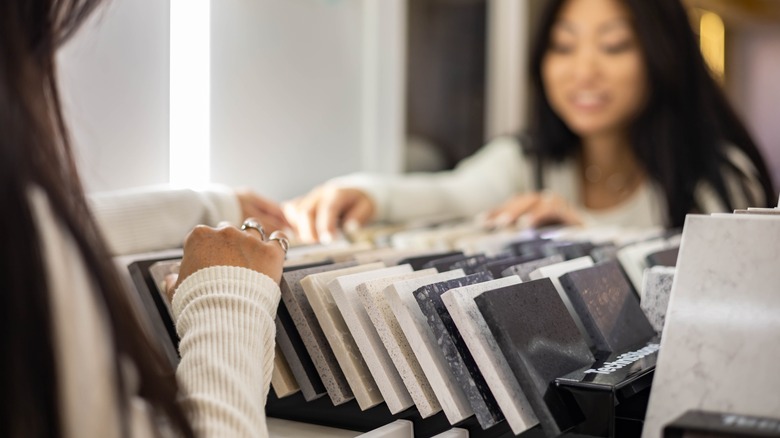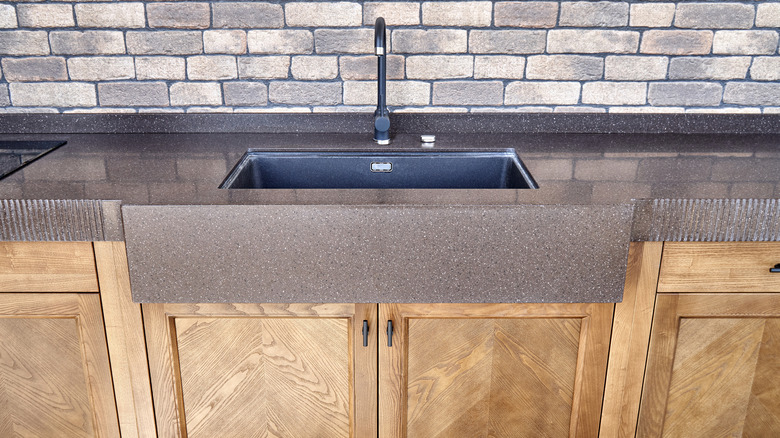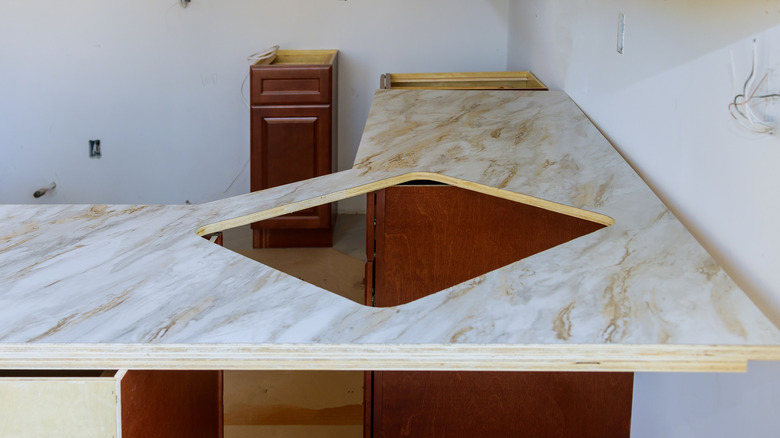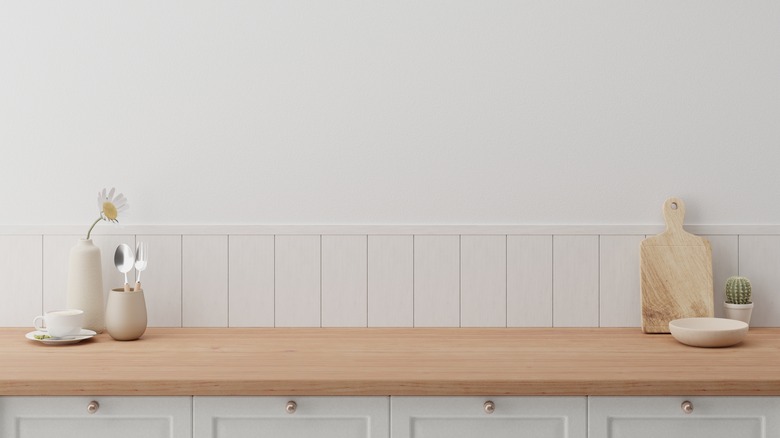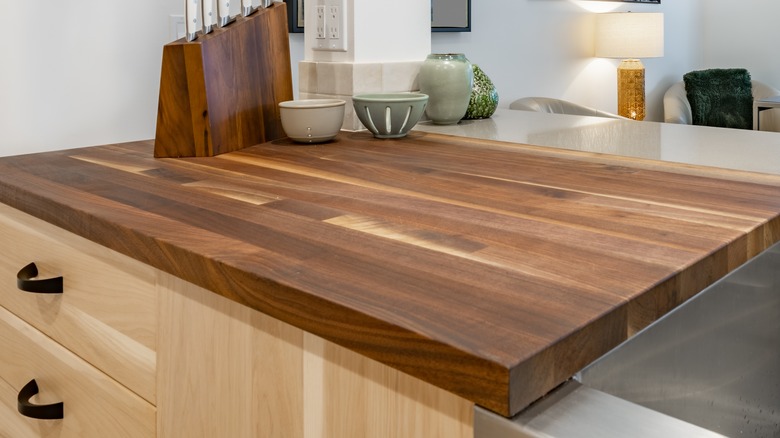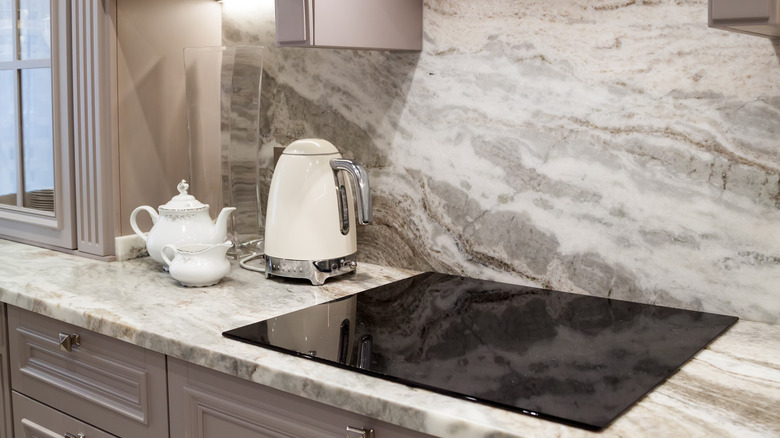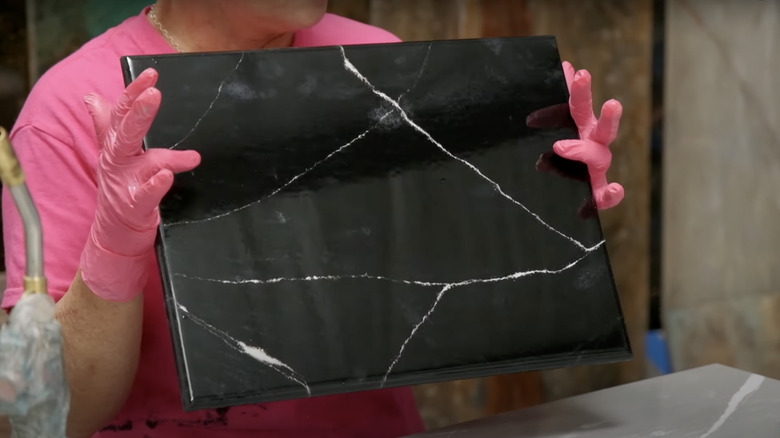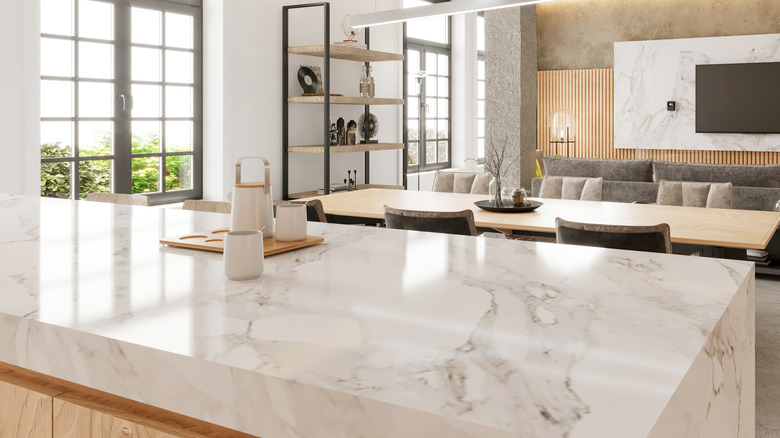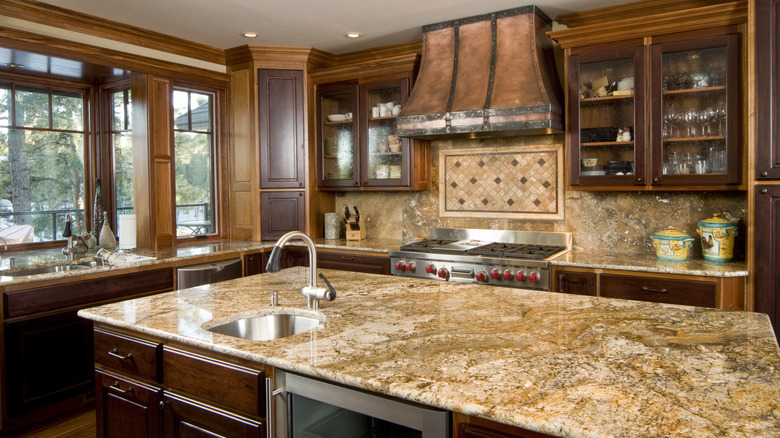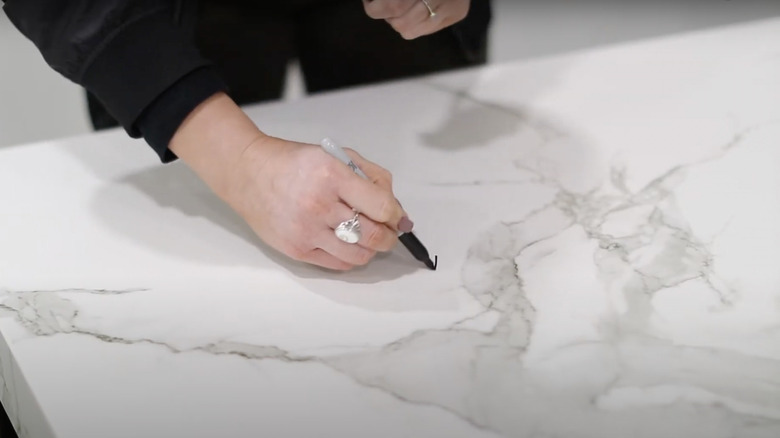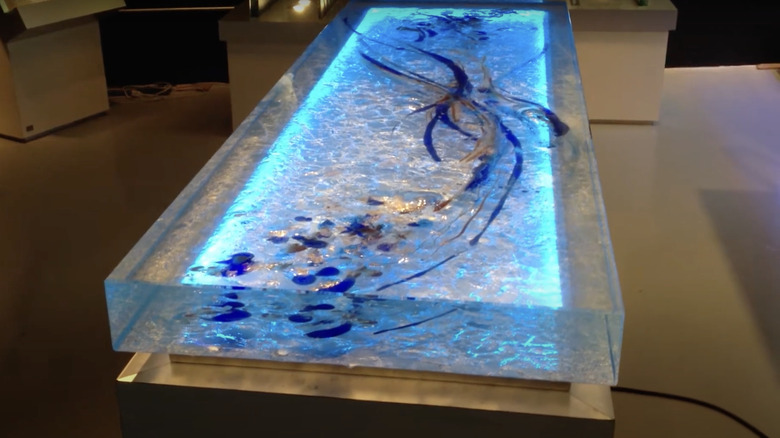How Much It Will Cost To Update Your Countertops Depending On Material
Replacing your countertops completely transforms a room. Whether it's a small installation in a cramped half-bathroom or an extensive project in a grand kitchen, your choice of material affects the interior design and your quality of life. Countertop surfaces are made of artificial synthetics, natural wood, quarried stone, blown glass, or mixed combinations. These surfaces come from all over the world, and every day, companies are innovating to create newer and better versions to put on the market.
Choosing the material itself is just one of many choices involved. Many factors go into installing a countertop, and if you're on a budget, you'll have tactical decision-making to do along the way. The color, shape, grade, edging, quantity, and finish all influence the final estimate. Below are eleven types of countertop materials; some are more recognizable, while others are more obscure. Regardless of their popularity, each one has specific qualities or design choices that raise or lower their final price estimates, which is important to keep in mind when renovating.
Acrylic is a budget-friendly option
Acrylic countertops are a staple in rented apartments, townhouses, and single-family homes due to their high durability and appealing design options. Despite being made of standard resin, acrylic imitates expensive stone and has an elegant glossy finish. Seeing as this look holds up for decades, it's a surprisingly good deal for only $17 to $24 per square foot.
This estimated pricing is based on a seamless installation of builder-grade acrylic with a single sink and faucet cutout. Enhanced edges, added backsplashes, other cutouts, and unique countertop shapes will up the price estimate. Also expect to pay more if you go with a more reputable brand, such as Corian or Durat, to supply the material.
Laminate is all-around affordable
Made with plastic and particleboard, laminate combines cheap materials to make a surface that looks more expensive than it's worth. At only $20 to $60 per square foot, you can install countertops that look like authentic wood or stone, yet have all the benefits of synthetic material.
In fact, laminate can even be DIY-ed if you're really looking to save money. It's not complicated, and this short ten-minute tutorial on YouTube by @Lindi&Russ covers the basics. The type of finish affects laminate's total cost; a standard finish ranges between $10 to $15, an antimicrobial finish costs around $15 to $30, and a high-durability finish is the most expensive at $20 to $40 per square foot. Certain brands and their reputations for quality will also impact the price. Arborite products are usually under $30, while Formica can cost as much as $40 per square foot. Remember that you get what you pay for, and if you're going with a cheaper option like laminate, it won't hurt to at least choose a "luxury" laminate that's more likely to last long-term.
Standard wooden countertops are traditional and range from cheap to luxury pricing
Wooden countertops are the fourth most popular countertop type, according to Kitchen Bath Design's 2022 survey. While they aren't as popular as authentic stone, they're still a favorite among homeowners. Depending on the type of wood you choose, you're looking at prices from $25 to over $300 per square foot. Cheaper woods may be affordable, but you're looking at high costs to repair and replace unsealed and unfinished materials over the years. Leaning toward the middle- to high-end woods is highly recommended for long-term affordability.
There are dozens of wood types on the market, each coming from a different tree species. Generally, birchwood is the cheapest at around $25 (though some websites list it as low as $15) per square foot. In contrast, wenge and zebrawood can cost upwards of $300. This price is very high for good reason. They are difficult to work with and have incredible durability. Other factors also affect wood slab costs, including their thickness, grain type, and whether or not they are finished and sealed.
Rustic butcher block also serves as a massive cutting board
All butcher block countertops are wooden, but not all wooden countertops are butcher block. Butcher block is a combination wood surface, and it's made with several strips of lumber glued together to make a patchwork slab that doubles as a cutting board. Fixr states these countertops cost between $30 to $280 per square foot, while Home Depot puts the average installation price at around $40 to $100 per square foot.
Since butcher block is made of genuine wood pieces, the more expensive the wood type, the pricier the overall countertop will be. Standalone teak slabs are as high as $150 per square foot. In contrast, if you go with a lower-quality birchwood, the price decreases by up to 90%.
There are also four types of butcher block, which differ based on how the wood strips are pieced together. Face grain and edge grain slabs are laid side by side and require less wood than the other two options. End grain and blended types lie in various stripe and checkerboard patterns and require more material, making them more expensive. Although face grain is the most affordable, it's the only option not recommended for kitchen use. Unfortunately, since this style is laid face up and doesn't have many interlocking pieces, it's more easily damaged by cutlery and dishware, meaning you won't get as much use out of it as with the other options.
Authentic quartz is a natural stone within most budgets
Every natural quartz slab differs in quality, which is determined by its density and structural integrity. You should purchase from a quartz countertop fabricator, which is a professional who follows along with the installation process to ensure you get what you pay for. They help determine what size slabs your kitchen can support and how many seams are necessary for structural and aesthetic reasons.
The quartz slabs themselves range between $40 to $100 per square foot, depending on the grade (quality). Quartz is divided into three main categories: builder-grade-, premium-grade-, and designer-grade. With builder-grade, your total cost will fall at the lower end of the spectrum, while designer-grade can cost twice as much. There are obvious physical differences between the qualities. The cheapest quartz slabs are more "mixed" material and usually have more than 12% resin, which gives them a duller look. The priciest options are only around 7% to 8% resin and have minimal veining with rich coloring.
Retro porcelain tile countertops have reliable prices
Most countertop materials vary in type and quality, causing a considerable price variance that leaves many wondering if they can afford the installation. Traditional porcelain and grout tiles aren't as common in modern builds, but they do have one perk that appeals to people on a budget. Their cost range is not like others on this list and is considerably small at around $20 to $30 per square foot.
Few factors affect porcelain tile cost, which is why these numbers aren't that far apart. Since all porcelain colors are man-made and aren't dependent on the rarity of the material, you can go with virtually any pattern and hue for a similar price. You may only face an additional charge if you pick a specialized edge, such as a bevel, bullnose, or other shape, which can add $10 to $25 per square foot. Although many homeowners opt for a non-specialized edge, such as square or eased, they may also get the slides "mitered," which creates the illusion of a thicker countertop.
Soapstone has an unrivaled smooth surface for a moderate price
Soapstone still hasn't made it to the top five leading materials for kitchen countertops, but its popularity has climbed considerably over the years. It's a soft stone mixed with talc to make durable countertops that are sturdy but also have a similar texture feeling to dry bar soap. Depending on the source, this stone averages between $30 to $120 per square foot.
It's sold in several forms: smaller individual tiles, a prefab slab with a sink cutout, or full slabs. Tiles are the most affordable at around $30 per square foot, while the full slabs fetch a much higher estimate at as high as $120 per square foot. The fluctuations in price are also based on color. Soapstone comes in limited cool-toned colors, including black, green, gray, blue, and white. Gray soapstone is the easiest to find, making it a more affordable choice than marbled blues and greens.
Marble countertop costs rise and fall based on the stone's rarity and appearance
Despite its physical weaknesses, marble is one of the most popular countertop choices for kitchens and bathrooms. It's easy to accidentally stain with acidic liquids and scratch with sharp tools. However, many kitchen and bathroom designers take on these risks due to how beautiful the solid rock slabs look in interior design. There are many factors that go into authentic marble pricing, and there are countertops available for as low as $40 per square foot to as high as $200 per square foot on average.
Depending on the size and shape of your kitchen, you may need to cut the marble into several pieces, which can greatly increase the price. The thickness and edge type of the slab also affect the final estimate, with heavier and more unique shapes fetching a higher cost.
While shopping around, you'll notice all genuine marble products come with a grade ranging from the letters A to D. This grading is based on the coloring, veining, and any visible defects. A-rated slabs have minimal flaws and subtle vein colors, while D-rated slabs will have pronounced veining and may even have cracks that need repair. Like most countertops made from natural materials, the rarer the stone, the more you can expect to pay. The rarest marbles are far beyond what most households can afford, such as Italian Calcatta and Nero Portoro, which are over $2,000 and 3,000, respectively, per square foot.
Granite slabs are always in style for high-tier pricing
Granite countertops truly took over the 1970s, and though other materials have vied for their popularity, granite remains a top industry choice every year. Like quartz and marble, granite also greatly ranges in price based on its graded quality. You can find most slabs between $80 and $220 per square foot. However, the lowest and highest quality options may cost below and beyond that range.
The four main categories are basic, mid-range, high-end, and premium. Basic slabs are abundantly available and include colors like Brazilian Ubatuba and Santa Cecilia. In contrast, premium pieces, like Brazilian Blue (Azul) Bahia, is limited in availability and costs well over $200 per square foot. Generally, the higher the grade, the more vivid the colors are, and the fewer imperfections within the stone. Ironically, granite is quite the opposite of marble. While marble countertops with subtle colorings are in higher demand, designers prefer dazzling granite colors and patterns over neutral shades.
Innovative and manmade Dekton is rising in popularity
Dekton is one of the most obscure countertops on this list. It is a relatively new innovation and is a man-made material formed from over twenty natural minerals. The creators boast it has no micro-defects and minimal porosity, making it an ideal kitchen and bathroom countertop choice. This material may have supreme durability, but its efficient manufacturing process also keeps it within the same price range as more luxurious stone materials. These countertops cost between $80 to $160 per square foot.
Unlike genuine stone pieces, this material is more affordable when cut into smaller pieces. It's easier for the manufacturer to create smaller fragments than full slabs, so you can lower your overall price if you're okay with countertop seams. Solid colors also keep the price point lower, while patterns and stone-like textures will up the total installation cost.
Handmade glass panels are as precise and seamless as their cost suggests
All-glass countertops aren't a completely new idea, but they've never been commonplace in homes either. Recent innovations by the company "ThinkGlass" have introduced thick transparent glass panes that make for excellent countertops. They are precisely cut to fit custom kitchen layouts and, depending on the look and personalization, range from $200 to $400 per square foot.
Prices between $200 and $400 are not within many people's budgets. If you need to lower this cost, consider choosing recycled glass instead. Look for a local manufacturer that makes crushed glass countertops— they cost almost half as much at around $100 to $175 per square foot. There isn't much else you can do to lower the price of this unique but beautiful countertop. However, you can make it even more impressive by etching the surface or adding illuminated LED lights, though these options will up the final quote.
